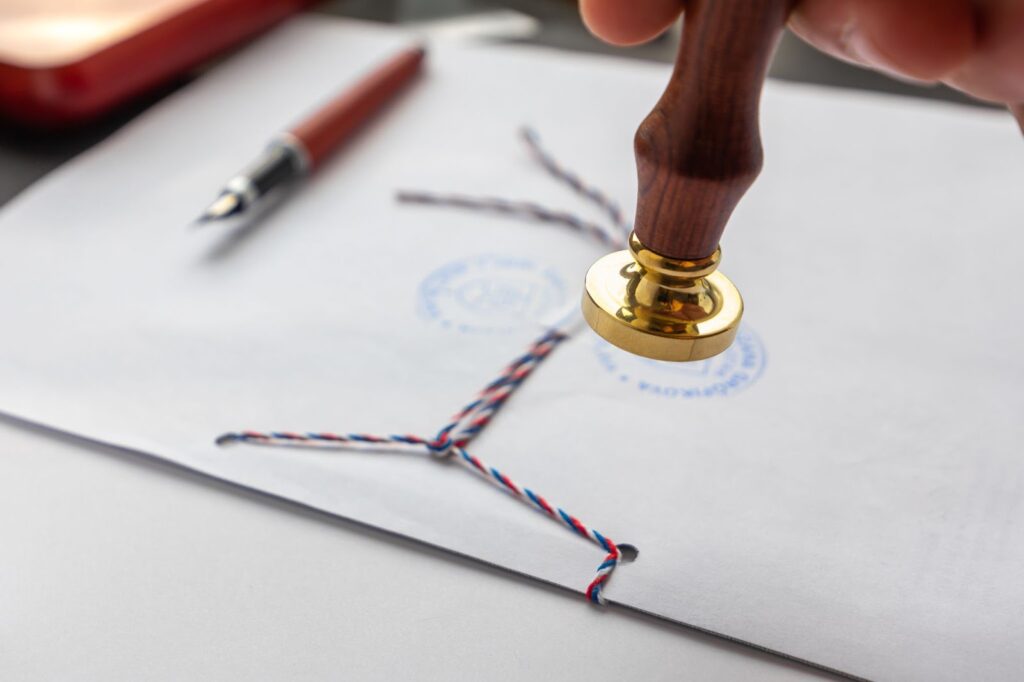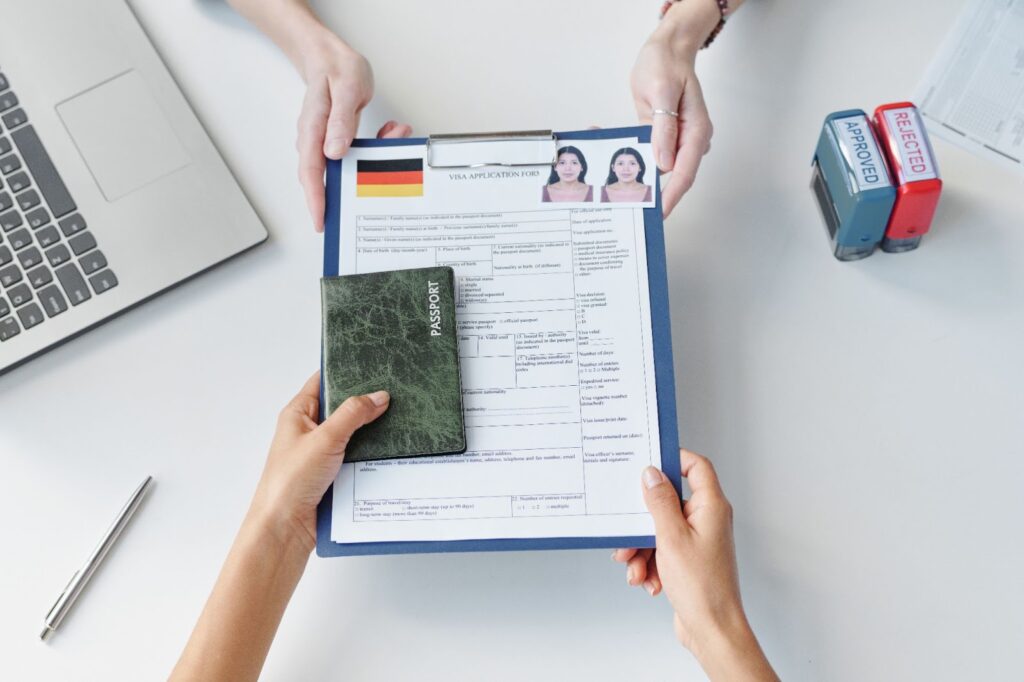
When you're dealing with international documents, you'll need to differentiate between an apostille and a notary. An apostille certifies documents like birth certificates and corporate agreements for global use under the Hague Convention, ensuring they're recognized internationally without further legalization.
A notary, however, mainly verifies your identity and authenticity of signatures for domestic transactions, enhancing security through tools like validating IDs. Knowing if your situation requires an apostille or notarization is essential, especially in cases like overseas property purchases or accepting foreign jobs.
Grasping these distinctions will equip you to handle document authentication more effectively.

An apostille is an official certification that authenticates the origin of public documents for international use, especially in countries part of the Hague Convention. You'll need this certification if you're dealing with international business, education, or immigration, where it's important to prove the authenticity of documents like birth certificates, marriage licenses, or corporate agreements.
When you're aiming to use public documents abroad, the apostille ensures that these documents are recognized as valid under the terms of the Hague Convention. This eliminates the need for further diplomatic or consular legalization, streamlining your international dealings significantly. Essentially, obtaining an apostille is a form of quality control that confirms to foreign entities that your documents are legitimate and trustworthy.
The process begins domestically with a notary public who verifies the signatures on your documents. Here, the notary acts as an initial gatekeeper, confirming the authenticity that the apostille will later affirm on an international level. Typically, after the notary's authentication, the documents are forwarded to the Secretary of State or a similar authority, who then issues the apostille.
This certification is particularly important when you're aiming to control perceptions of legitimacy and reliability in international arenas. Whether you're expanding your business, studying abroad, or engaging in international legal matters, the apostille provides a layer of assurance that your documents are recognized and respected globally. This control over document authenticity simplifies what could otherwise be a complex negotiation or compliance process in foreign jurisdictions.

A notary public functions as an official witness to the signing of documents, guaranteeing their authenticity and deterring fraud. As you explore the notarization process, you'll realize its importance in the legal system. The role of a notary public is essential; they provide a layer of security and efficiency that's vital for legal transactions.
The notarization process starts when you present your document to a notary public. This step involves verifying your identity, usually through a government-issued ID, which underscores the significance of security in these proceedings. After verifying your identity, the notary public witnesses your signature, ensuring that you're indeed the person signing the document and that the signing is voluntary.
Here's where efficiency and modern technology come into play. Tools like the Notary Journal App enhance this process by automatically populating journal entries and securely saving signatures. This app not only streamlines the process but also strengthens record-keeping security. It verifies IDs and captures all the necessary information in one interface, which meets government and legal audit requirements.
Moreover, the notary public finalizes the process by stamping or sealing the document, thereby certifying the notarization. This act prevents potential fraud by creating a legal deterrent against forging signatures or documents.

The differences between an apostille and a notary public in handling international document authentication are precise—they vary in purpose, acknowledgment, and procedure.
An apostille is tailored for international recognition under the Hague Convention. It verifies the origin of the public document, making it acceptable in any of the member countries.
On the flip side, a notary public primarily confirms your identity and the authenticity of your signature for domestic use. This process is essential for documents intended for use within your home country.
An apostille provides a higher level of international legal power, allowing documents to cross borders without further legalization. A notary's verification is generally limited to the state where they're licensed, which means their seal won't hold the same international weight.
Obtaining an apostille starts with notarization but extends to include certification by the Secretary of State and the issuance of the apostille seal. This multi-step process is more intricate and typically incurs higher fees than notarization, which is a single-step verification.
Notarization fees usually range from $0.50 to $20 per signature, depending on state regulations. In contrast, apostille fees can vary significantly but generally start around $20 per document and can go as high as $100 or more, depending on the state and the urgency of the processing.
Notary fees are often set by state law and can vary based on the type of service provided. For instance, mobile notaries may charge additional travel fees. Apostille fees, however, are influenced by factors such as the type of document, the state in which the apostille is being requested, and expedited service options. In some cases, additional courier fees may be incurred if the documents need to be sent to different state departments or embassies.
Let's explore some typical scenarios in which you might need a notarization or an apostille and how our app streamlines these processes.
Suppose you're buying a property overseas. To ensure your property documents are recognized internationally, you'll need an apostille. Our app starts by helping you get these documents notarized quickly. Then, it guides you through obtaining an apostille from the Secretary of State, making what could be a complex process much easier.
Another common scenario is accepting a job abroad. You'll likely need to apostille your academic certificates or background checks. Here, our app not only helps in getting these documents notarized but also provides detailed instructions and support for the apostille process, ensuring you meet all international legal requirements without hassle.
Now, let's address some questions:
Absolutely. The app identifies your document's requirements based on its purpose and destination, offering tailored solutions.
Yes, any signature saved through our app is legally valid and meets all necessary legal standards for notarization.
Your documents and personal information are encrypted and stored securely, adhering to the highest data protection standards to prevent unauthorized access.
Our app simplifies the notarization and apostille processes, giving you control and confidence in managing your international document requirements efficiently.
When considering notarization and apostille services, it's important to comprehend that notaries can't typically provide apostille services directly due to legal constraints. This differentiation is essential as you navigate the legalization process for your documents, particularly if they're intended for international use. Understanding each service's role ensures you maintain control over the document authentication process and comply with all necessary legal requirements.
Here are four key considerations to keep in mind:
The Secretary of State's office issues apostilles, ensuring your documents are internationally recognized. Always verify with local authorities for the latest updates.
No, a notary public cannot issue an apostille. Apostilles are issued by a Competent Authority, which is usually a state Secretary of State in the U.S. or similar authorities in other countries.
The purpose of an apostille is to authenticate public documents for international use, ensuring they're recognized as valid abroad. It's essential if you're dealing with foreign entities or require legal recognition overseas.
An apostille can be issued by the Secretary of State's office or, for federal documents, by the U.S. Department of State. It's essential for verifying document authenticity internationally.
An apostille certifies your documents for international use, ensuring they're recognized in countries that follow the Hague Convention. You'll get it from your Secretary of State or an authorized service.
The cost of obtaining an apostille is generally higher than notarization. Fees can vary widely depending on the state or country, the type of document, and the urgency of the request.
When you step onto the global stage, remember: an Apostille guarantees your documents transcend borders within Hague Convention countries, while a Notary Public anchors them firmly at home.
Whether you're expanding business horizons or pursuing international academia, understanding this distinction is important.Don't let the nuances of document authentication hinder your exploration. Embrace the requirements, and stride confidently across the domestic and international divide, equipped with the right certification for every venture.